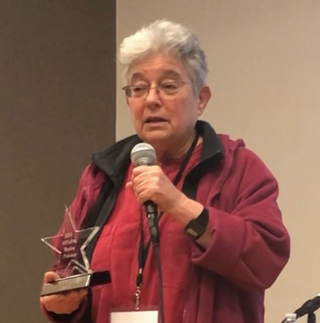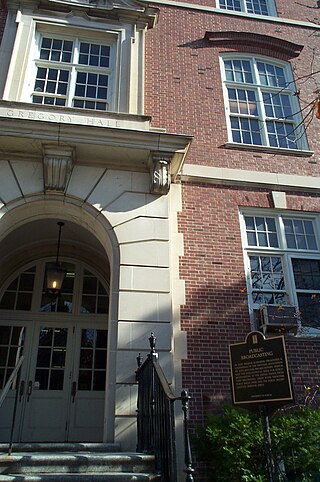Related Research Articles

The Corporation for Public Broadcasting (CPB) is an American publicly funded non-profit corporation, created in 1967 to promote and help support public broadcasting. The corporation's mission is to ensure universal access to non-commercial, high-quality content and telecommunications services. It does so by distributing more than 70 percent of its funding to more than 1,400 locally owned public radio and television stations.

Robert Charles Siegel is an American retired radio journalist. He was one of the co-hosts of the National Public Radio afternoon news broadcast All Things Considered from 1987 until his retirement in January 2018.
Morning Edition is an American radio news program produced and distributed by NPR. It airs weekday mornings and runs for two hours, and many stations repeat one or both hours. The show feeds live from 5:00 to 9:00 AM ET, with feeds and updates as required until noon. The show premiered on November 5, 1979; its weekend counterpart is Weekend Edition. Morning Edition and All Things Considered are among the highest rated public radio shows.

Robert Alan Edwards was an American broadcast journalist who was a Peabody Award-winning member of the National Radio Hall of Fame. He hosted both of National Public Radio's flagship news programs, the afternoon All Things Considered, and Morning Edition, where he was the first and longest serving host in the latter program's history. Starting in 2004, Edwards hosted The Bob Edwards Show on Sirius XM Radio and Bob Edwards Weekend distributed by Public Radio International to more than 150 public radio stations. Those programs ended in September 2015.

Daniel Louis Schorr was an American journalist who covered world news for more than 60 years. He was most recently a Senior News Analyst for National Public Radio (NPR). Schorr won three Emmy Awards for his television journalism.
Bill Kurtis is an American television journalist, television producer, narrator, and news anchor.
The National Association of Educational Broadcasters (NAEB) was a US organization of broadcasters with aims to share or coordinate educational programmes. It was founded as the Association of College and University Broadcasting Stations (ACUBS) in 1925 as a result of Fourth National Radio Conference, held by the U.S. Department of Commerce.
KERA is a non-commercial, listener-supported public radio station in Dallas, Texas. It is a member of National Public Radio (NPR). KERA 90.1 FM, KKXT 91.7 FM and KERA-TV 13, a PBS affiliate, are owned by North Texas Public Broadcasting, with studios on Harry Hines Boulevard in Dallas.
Mara Liasson is an American journalist and political pundit. She is the national political correspondent for NPR, and a contributor at Fox News Channel.

The Public Broadcasting Act of 1967 issued the congressional corporate charter for the Corporation for Public Broadcasting (CPB), a private nonprofit corporation funded by taxpayers to disburse grants to public broadcasters in the United States, and eventually established the Public Broadcasting Service (PBS) and National Public Radio (NPR). The act was supported by many prominent Americans, including Fred Rogers, NPR founder and creator of All Things Considered Robert Conley, and Senator John O. Pastore of Rhode Island, then chairman of the Senate Subcommittee on Communications, during House and United States Senate hearings in 1967.
WLRN-FM and WKWM are non-commercial, listener-supported, public radio stations for South Florida and the Keys. WLRN-FM is licensed to Miami and WKWM is licensed to Marathon. They are owned by Miami-Dade County Public Schools. The offices and studios are on NE 15th Street in Miami.
The National Educational Radio Network (NERN) was a means of distributing radio programs in the United States between 1961 and 1970. With funding from the Ford Foundation, the network began broadcasting on six radio stations on April 3, 1961.
The National Public Broadcasting Archives (NPBA) – housed as part of the Broadcasting Archives at the University of Maryland – preserves the history of American non-commercial broadcasting materials. It is housed at the University of Maryland, College Park in Hornbake Library. NPBA serves as a living reminder of the cultural and intellectual continuity of the effort to make television something more than commercial networks can provide. Its mission is to work with the primary national entities of American noncommercial broadcasting to identify records and programs of historical value and to serve as a repository for those materials. Its collection is open to the public.

Frieda Lindfield Werden is an American and Canadian radio producer. She is the co-founder and producer of the weekly radio series WINGS: Women's International News Gathering Service, which debuted in 1986 and has been in weekly syndication for more than twenty-seven years. Produced by and about women, WINGS broadcasts on non-commercial radio stations worldwide.
WHRV is a non-commercial, listener-supported, public radio station licensed to Norfolk, Virginia. It is the flagship NPR member station for the Hampton Roads section of Virginia, and is a sister station to the area's PBS member, WHRO-TV 15. They are owned by the Hampton Roads Educational Telecommunications Association, a consortium of 19 school districts in Hampton Roads and the Eastern Shore. Studios are in the Public Telecommunications Center on the campus of Old Dominion University in Norfolk.
Lee Conrad Frischknecht was a broadcast journalist and, from 1973 to 1977, was the second president of National Public Radio.

National Public Radio is an American public broadcasting organization headquartered in Washington, D.C., with its NPR West headquarters in Culver City, California. It serves as a national syndicator to a network of more than 1,000 public radio stations in the United States. It differs from other non-profit membership media organizations, such as the Associated Press, in that it was established by an act of Congress.

Greg Rowe Barron is an American radio and television journalist, producer and communications executive. His early radio feature work influenced public radio storytelling in the United States and how sound is used in documentary production. Described by Variety in 1981 as "one of the most renowned creators of radio documentaries in the nation", his work as a producer for Minnesota Public Radio between 1972 and 1980 was recognized by numerous regional and national journalism awards and he was an early advocate of the use of high fidelity stereophonic sound as an integral element of radio journalism.

In the United States, other than a few direct services, public broadcasting is almost entirely decentralized and is not operated by the government, but does receive some government support.
Samuel C. O. Holt was a radio and television executive who made significant contributions to the early development of the Public Broadcasting Service (PBS) and National Public Radio. As the first programming director at PBS, Holt helped created such programs as Masterpiece Theatre and The MacNeil-Lehrer Report. When NPR was formed in 1970, the leadership of the network followed many of the recommendations in Holt's report, Public Radio Study, which urged noncommercial radio stations to “think about being something other than…a classical music turntable.”